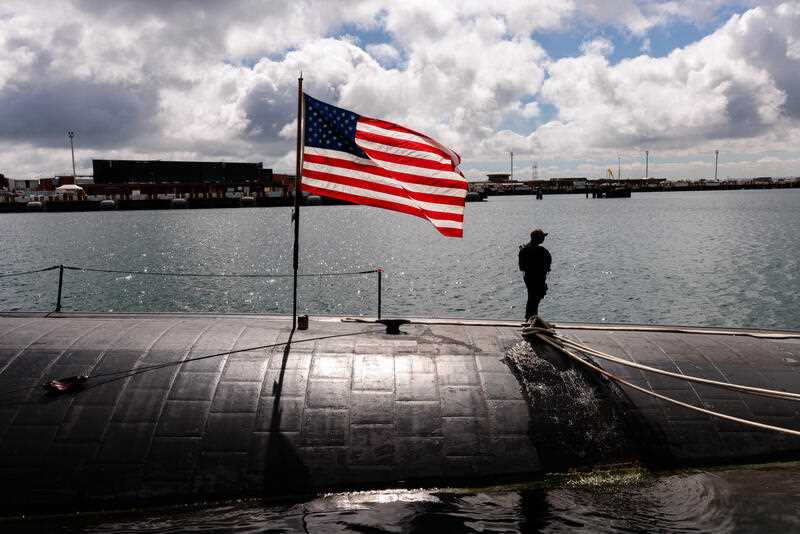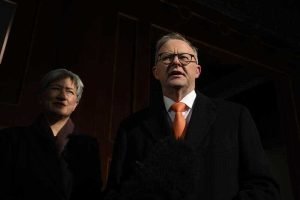The Shot
The AUKUS truth: bipartisan defence policy sells short Australian sovereignty

The government rammed home the latest Defence Strategic Review (DSR) on the eve of ANZAC day, when we honour the dead and nod solemnly at the horror and folly of war. The dawn services blew ‘The Last Post’ from Clovelly to Çanakkale, and the ‘Missile Age’ was all of a sudden drummed into the Australian political lexicon, ushering in sweeping changes to the strategic posture of our military in ways not seen since the Second World War. Richard Marles, Defence Minister for barely a year, and a shadow minister in perma-opposition mode for a political generation before that, has been the conduit to the supercharging AUKUS since arriving in government. He is delivering the DSR with the same unconvincing mumbling.
Fresh after the announcement of an additional 50% contingency fund to meet “unexpected overruns” for the infinitely expensive AUKUS submarines, the DSR attempts to provide a pathway to the strategic realignment needed to meet our expedited floating nuclear promise, requiring a complete overhaul of every ounce of our military to stand a chance of realising it. The review insists on developing “impactful projection”, signalling a rapid transition to long range strike missiles, while building up missile stockpiles and expanding the ADF’s ability to conduct maritime operations abroad. All of this is happening while cutting long overdue funding for programs such as the infantry fighting vehicle.
Marles explains that the review is geared towards preserving the rules based international order upheld by the United States, but this outlook runs in contrast to the current decline of American society and its waning influence abroad. The year-on-year decline in America since Barack Obama pledged the pivot to Asia from Canberra a decade ago, from Trump, to Biden, to the distressingly real threat of Trump 2.0, has seen heightened domestic political chaos, mass homelessness, the proliferation of sickening gun violence, and the breakdown of communities across the United States. For all our government’s talk of shared values when justifying AUKUS and the DSR, it seems that many of them do not align with our own.
The fall in American prestige has coincided with the rise of multipolarism led by an ascendant China, the nations of BRICS (Brazil, Russia, India, China, South Africa) and the developing world – the response we see is a ratcheting up of tensions between two major superpowers in competition for two opposing systems. The DSR leans into these tensions, choosing a side, and realigning our entire national defence philosophy from a strategy that encourages a regional defensive mindset and warns against “chasing ground”, to a more aggressive forward-facing posture, looking to project attacking force beyond our region. Among all this chaos, we are throwing our lot into a defined outcome, betting too big on a decaying superpower with whom we have less and less in common with each passing school shooting.
ANU Professor Hugh White highlights that the DSR is full of ambiguities. On the one hand, the report suggests that Australia needs to develop a sovereign capability to unilaterally deter “any state from offensive military action against Australian forces or territory”, but on the other, it says that “this can only be achieved by Australia working with the United States”. White thinks that the changing order of power in Asia and the rise of China, India and Indonesia means that “the balance of wealth and power is shifting against the United States” in the region. With all these moving parts, at a time when Australia needs to carefully consider its strategic future more than ever, the DSR has us precariously stretched between protecting the US-led regional order and guarding our own security independently.
Much of the motivation compelling this rapid strategic realignment, populating the threat matrices and inspiring the analysis, is in response to the rise of China as a global superpower. The country that sits as our number one two-way trading partner has risen to become a peer and a competitor to our largest military ally in the United States, threatening its great power primacy and challenging the unipolar status it has enjoyed since the fall of the Soviet Union. The old axiom that “Australia doesn’t have to choose between America and China” has morphed quite suddenly into choosing to stake our strategic destiny onto US battleplans that include aggressive containment of China in its own region. Seems like quite a choice!
Midnight Oil wrote music about Pine Gap, continuing a proud national legacy of protest through art and song that reflected the sentiment of a culture opposed to war. Back then the news services like the ABC used to promote public awareness and cover anti-war protest movements, but over the years a shift has occurred, as Australian political decisionmakers have teamed up with tabloid cheerleaders to pop the hand up for vassal status under Washington in lieu of any sovereign originality. John Howard’s soporific reign during the War on Terror, Julia Gillard opening up the bases to US Marines in Darwin, the admission of nuclear capable B52s to be stationed at an upgraded facility at Tindal, the acquisition of US built nuclear powered military assets focused on attacking rather than defending, and the Labor government’s rejection of parliamentary war powers reform, reflect a mindless bipartisan shuffle towards militarisation via a dangerous strategic codependency with the declining United States.
AUKUS was a Morrison-era decision, shrouded in Morrison-era secrecy, devised in bad faith by a Morrison government without briefing the Labor opposition, and involved secret phone calls with Mike Pompeo and Joe Hockey in the era of Donald Trump. After being in the blind for the initial negotiations, Labor’s irrational zeal for the submarine deal has been demonstrated by its eye watering half-trillion-dollar overcommitment to them, surpassing Morrison’s wildest dreams and an inflation-weary precariat’s worst nightmares, and leaving the nation completely dumbfounded. This Labor government may well have inherited all the problems we elected them to solve: the price of living, frozen wages, insecure work, insecure mortgages, one in six children in poverty, one of the lowest welfare cheques in the OECD, corporate profit driven inflation, housing, the problems of a post pandemic hellscape; but they seem to have walked passed all of it in an effort to solve America’s crumbling hegemony in Asia and to ramp up military spending to cartoonish proportions.
There are good reasons to investigate our strategic readiness in a time of such tectonic geopolitical consequence, but the “impactful projection” encouraged by the review brings us closer to vassal status under a US desire to retain primacy in Asia, and risks making us a key component in a hypothetical war with China. The DSR tries to have its feet in both camps, calling for the need for strategic independence in the region, but badly hinting it needs to do so by preserving American power in Asia.
We live in a time requiring bold and important sovereign decision making, not former US Admirals given consulting jobs to review and make recommendations on our fleet of warships, and certainly not Joe Hockey as the number one point-man of AUKUS. In the shadow of AUKUS, the DSR has not succeeded in making the distinction between the independence and interdependence it speaks of in one breath, failing to offer a truthful demonstration to Australians about where our defence policy is heading.
The government seems under equipped to deal with this situation, lacking a backbone to challenge the legacy of the last decade of Coalition malaise, and with no ability to articulate how things could be if we thought independently as a nation state. After being roped into this position by a duplicitous Morrison government and barred from the AUKUS negotiations while in opposition, the government has passed on the opportunity to challenge the trajectory and tripled down, scared to take any position that dare challenge this new and dangerous status quo. Through a lack of inspiration, a callous detachment, and political cowardice, they continue to cede our sovereignty because its politically expedient for them to do so.






